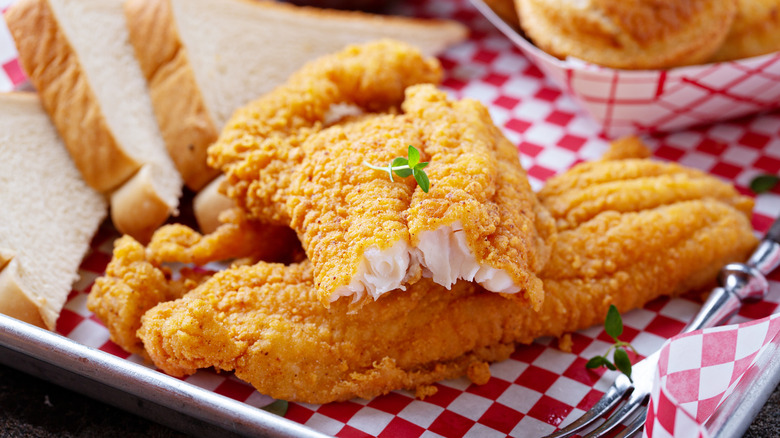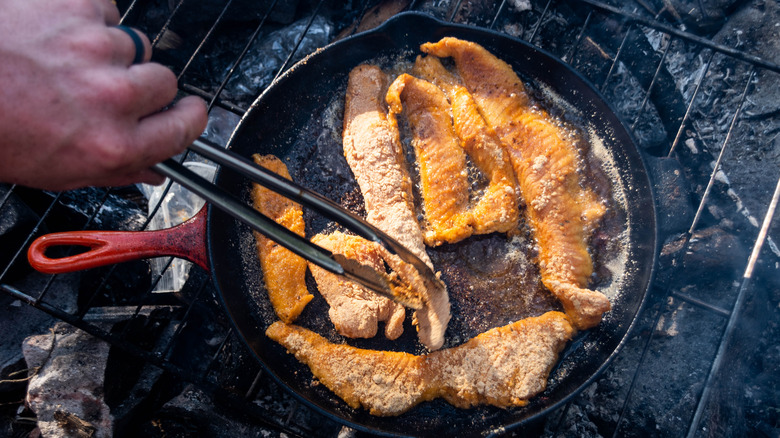Southern Fish Fry's Cultural Origins
There's "frying fish" in your kitchen, and then there's the typically outdoor "fish fry." Distinguishing the two may sound like mere semantics, but anyone in America's Deep South can set you straight on that. For starters, one is a verb and the other a noun –- and yep, it matters a lot.
Whether frying catfish, bream, or bass takes place indoors or outside, in a deep fryer, air fryer, or cast-iron skillet, it's still a simple culinary act of preparing food for consumption. But a "fish fry" is a cultural event, a get-together, a "thing" with its own food, customs, and echoes of history.
Deeply woven into the intriguing density of Southern life, especially in Black communities, fish fries take place routinely on warm summer or autumn evenings in neighborhood backyards, parks, community halls, and dedicated "fish shack" eateries. A fish fry invitation may indicate a special occasion, or more commonly, it's a simple "come on by" hollered over a neighbor's fence or dropped at a local coffee shop.
And that's the point: A Southern fish fry, with its traditional platters of crispy fried fish and side dishes, is a low-key, drop-by way of connecting with friends, family, or new acquaintances in fresh air, sunshine, or casual indoor meeting spaces. Sounds simple, right?
The origins of the deep-rooted Southern fish fry, however, tell a more nuanced story. As with many Southern traditions, it arches backward to slavery and the complex cultural ties formed in its wake.
Plantation life and the Southern Diaspora
It would be a mistake to assume that fish fries in America take place only in Southern states and only within Black communities. Because of the Southern Diaspora in which 20 million people from Southern states migrated north and west between the 1900s and 1970s, many culinary traditions trod the same pathways –- including barbeque, black-eyed peas, sweet potato pie –- and the good-ole Southern fish fry.
Food historian Adrian Miller, a James Beard Award winner and self-ascribed soul-food scholar, tells the New York Times that, historically, fish fries have always been common in water-centric areas. But within Black communities, the tradition goes much deeper, taking root on slave plantations in which their ancestors toiled.
Life on the plantations consisted of long days of labor but typically wound down by Saturday afternoon. Enslaved workers were allowed some downtime, which many used to go fishing in nearby ponds or lakes, bringing home a fresh catch to share with others in the slave quarters. Those fleeting moments of freedom to mix, mingle, and share food of their own making gave birth to the Saturday night fish fry. After Emancipation from slavery, and the gradual Great Migration to regions with more opportunities, many descendants of former slaves still cherish the deep cultural ties of the fish-fry tradition.
What to expect if you come on by
As time rolled on, the traditional Saturday night fish fries gravitated to Friday nights, which Miller says could be a result of Catholic influence in larger cities. Catholic customs of eating fish on Fridays encouraged better seafood prices and market availability on that day. In modern society, it also signifies the end of the work week, a nod to that much-cherished break from labor relished by former slaves.
If you're lucky enough to get a "come on by" invitation to a traditional fish fry, expect some digging into down-home conversation and longtime favorite dishes. Depending on location and how many historical standbys still hold sway, you'll be filling up with deep-fried catfish battered with cornmeal, piping-hot hushpuppies, freshly made cole slaw, dashes of fiery homemade hot sauce, and cornbread or slices of white bread to soothe the palate.
Go ahead and pile that plate way high; nobody's looking or caring –- unless to say, "eat on up now." And save room for some pecan pie, 'nana pudding, or peach cobbler.


